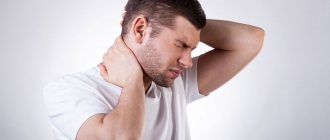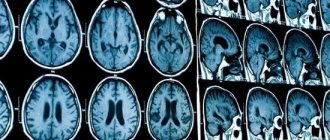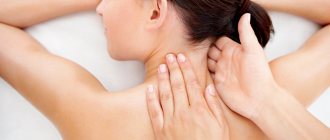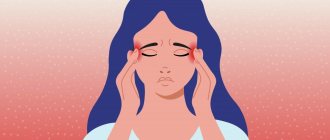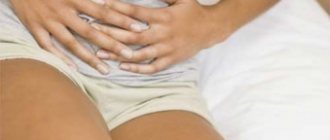Table of contents
Relieve tension Change contraceptive method Check your vision Primary or secondary headache? Sources
Headache can be caused by stress, fatigue, taking oral contraceptives, overstrain of the eye muscles with incorrectly selected glasses or lenses, a jump in blood pressure, dysfunction of the temporomandibular joint, which in turn leads to secondary tension in the cervical-occipital muscles, causing tension in the aponeurosis, and many other reasons.
One of the common triggers of headaches can be anemia, leading to chronic pain syndrome.
It happens that there is no painkiller at hand or it is impossible to use: the pain is caused by a side effect of another drug, the patient fundamentally avoids taking pills, the medicine cannot be taken due to pregnancy or lactation. How to relieve a headache in this case?
when a headache is a warning sign
Sometimes a headache is a symptom of some disease, in which case neither home remedies nor painkillers will help. You should see a doctor about headaches in the following cases:
- ● pain occurs more often than 2-3 times a month, and cannot be explained by loose nerves, colds, menstruation (in women) or other understandable factors;
- ● pain is practically not relieved by anything, even with the most powerful painkillers;
- ● the occurrence of headaches is accompanied by an increase in body temperature, nausea or impaired coordination of movements.
If you have a headache after experiencing nervous stress or for some unknown reason, there are several simple ways to quickly return your health to normal.
Relieve tension
Tension headaches are a common problem for people whose jobs involve high levels of concentration, responsibility, and stress.
The prevalence of this type of pain in the world ranges from 46 to 78%. Statistically, tension headaches lead to more missed work days than migraines. There are three categories of tension headaches: infrequent episodic, frequent episodic and chronic. Doctors usually advise treating headaches with over-the-counter analgesics. However, with frequent and chronic pain, medications soon stop helping.
Massage helps treat headaches. Scientists conducted an experiment: over the course of 4 weeks, they conducted four treatment sessions for participants in two groups. For the first group, therapy included massage and manipulation of the cervical spine, for the second group - only massage. 8 weeks after the experiment, participants in both groups showed significant improvement in performance.
A course of relaxing massage, gentle manual practices, and osteopathic techniques can be an effective method of reducing the frequency and intensity of headaches. But if this is not possible, then an independent head massage will help relieve the spasm that is causing the problem.
Cervical exercises can also help situationally: bending and turning the neck will improve blood circulation and reduce the intensity of pain.
But you should be careful with circular movements, they can provoke spinal tension.
If the pain is caused by mild stress or fatigue, you can use breathing practices, meditation and other methods that reduce arousal.
Does paracetamol help with headaches?
Paracetamol is an affordable and time-tested medicine for various types of pain. The drug alleviates the physical condition and has almost no side effects. The medicine helps adults and children, but requires careful dosage when used.
Paracetamol mainly acts as a pain reliever. The phenacetin derivative inhibits the production in the body of compounds responsible for sensitivity to pain - prostaglandins. At the same time, it affects the thermoregulation centers, reducing high body temperature.
Paracetamol is good for relieving headaches in acute respiratory infections. In other cases, it is worth using another analgesic or seeking medical help. In some cases, paracetamol will only dull the pain, but not solve the problem completely.
Change your contraceptive method
In some cases, if you have a headache, it should be treated not by prescribing medications, but, on the contrary, by stopping taking them.
For example, patients suffering from migraine with aura should avoid taking combined oral contraceptives due to the high risk of ischemic stroke due to their ability to provoke thrombogenesis. For women suffering from severe headaches and migraines without aura, the risks are lower, but for them exogenous hormones and estrogen withdrawal may also be triggers.
Therefore, if you notice that after starting to take oral contraception, headaches have become more frequent and intense, this is a reason to think about changing your method of preventing pregnancy.
From a sick head to a healthy one
Pain from which your head simply splits in half... Do you know this picture when it seems that you are ready to drink a whole mountain of painkillers just to let it go? Fortunately, pharmacies offer a whole arsenal of medications. But don’t rush to grab the pills. Try to first understand why you have a headache? The head of the Regional Center for Diagnostics and Treatment of Headaches OKDC, Candidate of Medical Sciences Elena Shestel will help you figure this out.
All “happy” heads hurt the same...
In healthy people, headaches can be caused by stress or simple overwork. The fact is that negative conditions such as anger, anxiety, fear lead to prolonged tension in the muscles of the face, shoulders and neck. Nerve endings are “pinched” in tense muscles, and the nerve impulses coming from them are transmitted to receptors located in the soft tissues of the head - a person feels pain. Staying in a sitting, bent position for a long time can also cause pain, since the back and neck “go numb” in this position, and this leads to vasoconstriction and a reduction in blood flow, which, in turn, causes a lack of oxygen in the tissues and the accumulation of metabolic products in them . At the same time, dilation of blood vessels (for example, due to excessive eye strain) leads to irritation of nerve endings, which also causes headaches.
According to WHO, 99% of people on earth experience a headache attack at least once in their lives. Most often, it goes away on its own: just drink hot tea, relax, take a bath, adding a few drops of essential oils to the water: lavender, lemon, peppermint... Fragrant foam and sea salt are welcome! Or stand in a hot shower to help relieve cramping headaches caused by muscle spasms in the back of the neck and head. You can take mustard foot baths - they reduce blood pressure in the brain. In addition, cold compresses help well, as they constrict the blood vessels in the painful area and reduce painful pulsation. A bag of ice cubes wrapped in a towel should be applied to the forehead, temples or back of the head for approximately 10–15 minutes. Listen to calm, pleasant music or watch an interesting comedy program. Laughter not only tones blood vessels, but also promotes the production of pleasure hormones, endorphins, which have an analgesic effect. You can massage your head with light stroking movements from the forehead to the back of the head.
But, if the pain does not go away for a long time, if it often recurs, then you need to deal with it in the doctor’s office.
The fact is that a headache can be a manifestation of such threatening diseases as a brain tumor, heart attack or stroke, cerebral hemorrhage, meningitis, encephalitis, trauma... In this case we are talking about secondary headaches - in the medical classification their number is close to three . But, fortunately, this situation occurs only in 2% of cases. Most often, pain is not associated with structural disorders of the brain and is benign in nature with a favorable prognosis. They are called primary. The most common among them are migraine, tension headache, and cluster headache.
Illness of responsible people
Almost a fifth of the world's population suffers from migraines. It has been noted that the disease, as a rule, occurs in people who are ambitious, responsible and conscientious, who tend to overload themselves with work. Migraines are often hereditary. It is noteworthy that the weaker sex is most susceptible to this serious but not fatal illness. The symptom of the disease is well known: with a migraine, only half of the head hurts. Severe throbbing pain during an attack can affect the orbital, parietal, temporal or occipital region of the head. Sometimes before an attack a person experiences a special visual aura: flickering spots, unclear outlines of objects, darkening in the eyes. Multi-day attacks that occur several times a month turn life into torture. Conventional analgesics, as a rule, are not effective; special anti-migraine vasoconstrictor drugs are required. They should be taken at the beginning of an attack. But only a doctor should prescribe a medicine, based on the individual characteristics of the patient and concomitant diseases.
Courageous on the outside, gentle on the inside
However, you should not think that headaches are a purely female privilege. For example, cluster headaches, the most painful of all, are unique to men. It manifests itself in characteristic painful periods with a duration of 15 - 180 minutes, repeated several times a day for up to 3 months. This is an extremely intense paroxysmal pain localized in the area of one eye, accompanied by lacrimation, nasal congestion and a pronounced feeling of anxiety and restlessness. The pain disappears suddenly and sometimes does not bother the person at all for several years. There is a widespread belief among doctors that cluster pain affects representatives of the “stronger” sex with an exceptionally masculine, but deceptive appearance. In fact, they are soft, fearful, indecisive.
Tired - take a rest
Everyone knows the headaches associated with overwork. Its cause is not only stress, but also a busy work schedule, personal problems, and weather changes. This is the most common type of headache, the so-called tension headache. It manifests itself in the form of episodes lasting from several minutes to several days, usually bilateral, squeezing or pressing, of moderate intensity. But often, in the absence of proper treatment, such a headache becomes chronic, is permanent and is poorly relieved by taking classical analgesics.
Don't rush to take pills
What to do if you have a headache? First and most importantly, do not rush to take medications. No matter how good, modern and expensive the drug is, any of them has side effects. This is especially true for homeopathic remedies and dietary supplements. In addition, self-administration of medications gives only short-term results, but does not affect the mechanisms of pain. As a result, the headache returns again and again, the amount of painkillers increases, which leads not only to the development of side effects of the drug itself, but also to the development of dependence on analgesics, which in itself can also provoke headaches. Only a doctor can select appropriate therapy with specific drugs, and in such cases medications must be taken under strict medical supervision.
Important
Very often, headaches are caused by certain provoking factors - triggers. They are different for everyone and can change in one person from attack to attack. Here are the most common ones:
- Nutrition. Basically, this is an irregular diet. In addition, some people are sensitive to certain types of foods (cheese, chocolate, coffee, citrus fruits). Alcohol, especially red wine, beer, champagne, and cocktails are common headache triggers.
- Dream. Lack of sleep or prolonged sleep are common causes of headaches. Try to get up on weekends no later than 2 hours from your usual awakening on weekdays.
- Physical exercise. Heavy physical work or intense exercise in the gym can trigger headaches, but at the same time, regular exercise and maintaining physical fitness are a good defense against this scourge. Dosed aerobic exercise and swimming are desirable.
- Environment: bright or flickering light, strong (sometimes even pleasant) odors, stuffy rooms, sudden changes in weather, long trips (especially with time zone changes).
- Psychological factors: negative emotions or, surprisingly, relaxation after a stressful situation.
- Hormonal factors in women: a certain phase of the menstrual cycle, pregnancy, menopause, taking or interrupting hormonal contraception.
If you have changed your lifestyle and you continue to have headaches and are forced to take more than 2 tablets of analgesics per month, you need to consult a doctor.
What is strictly forbidden:
- Drinking alcohol. It dilates the blood vessels and at first it actually becomes easier, but then the condition worsens.
- To drink coffee. If you have high blood pressure or are prone to atherosclerosis, even one cup of coffee can be harmful. However, for hypertensive patients, on the contrary, a couple of sips of coffee will be a salvation. For those who constantly take large doses of this drink, an extra dose will not help, but will only make it worse.
- Smoking. Nicotine causes a sharp spasm of blood vessels, which will make the pain even more intense.
Main:
If you have changed your lifestyle, but you still have headaches and you are forced to take analgesics more than 2 tablets per month, you need to urgently consult a neurologist. Residents of the Rostov region have a unique opportunity to get to the only Regional Center for Diagnostics and Treatment of Headaches in the south of Russia based on the OKDC. In order to undergo an in-depth examination that meets European standards and receive specialist advice, it is enough to have a compulsory medical insurance policy and a referral from a district hospital or clinic.
The staff of our headache center are members of the Russian Society for the Study of Headache (ROIGB).
share information
0
Social buttons for Joomla
Primary or secondary headache?
Headaches are divided into primary and secondary.
Primary headaches have no structural or metabolic cause. It is mild pain of this type that can be relieved with relaxation, massage, walking in the fresh air, and so on. These also include tension headaches, migraines, cluster headaches, and analgesic rebound headaches. Secondary headaches are caused by conditions such as increased intracranial pressure, pseudotumor cerebri, subdural or intracerebral hematomas, hypertension, meningitis, temporal arteritis, Lyme disease, and brain tumors.
An accurate diagnosis and identification of the causes of headache largely determine the success of its treatment.
Therefore, if you experience frequent, intense or chronic headaches, you need to be examined by a specialist. In this case, it is better to start with a visit to a neurologist and ophthalmologist.
Why does my head hurt in the forehead area?
This phenomenon is quite common in all age groups of the population. Such pain can be acute or chronic, occur independently or in combination with other symptoms. Pain in the frontal lobe occurs even in a healthy person, so their one-time occurrence should not be a cause for concern.
If a person constantly has a headache in the frontal lobes, then there are a number of reasons for this:
- Tension headaches can occur even in healthy people. We must remember that rest is an integral part of the life process. This pain may go away after taking analgesics.
- Eye pain may also spread to the forehead area. The pain begins behind the eyes and spreads to the frontal lobe. Its manifestations are similar to tension headaches: they occur against the background of overwork or active mental work, last from several hours to several days, and are easily relieved with over-the-counter analgesics.
- Sinusitis causes sharp pain in the frontal part of the head and nose. Accompanied by impaired nasal breathing, lacrimation and decreased sense of smell.
- Arteritis is considered the rarest cause of headaches. The disease is associated with inflammation of the walls of large arteries. They become dense and visible above the surface of the skin. The main symptom of the disease is acute pain in the forehead.
Sources:
- Scripter C. Headache: Tension-Type Headache. FP Essent. 2018 Oct;473:17-20. PMID: 30346680.
- Espí-López GV, Zurriaga-Llorens R, Monzani L, Falla D. The effect of manipulation plus massage therapy versus massage therapy alone in people with tension-type headache. A randomized controlled clinical trial. Eur J Phys Rehabil Med. 2021 Oct;52(5):606-617. Epub 2021 Mar 18. PMID: 26989818.
- Marks DR, Rapoport AM. Practical evaluation and diagnosis of headache. Semin Neurol. 1997;17(4):307-12. doi: 10.1055/s-2008-1040943. PMID: 9474710.
- MacGregor E.A. Contraception and headache. Headache. 2013 Feb;53(2):247-76. doi: 10.1111/head.12035. PMID: 23432442.
- Allais G, Gabellari IC, De Lorenzo C, Mana O, Benedetto C. Oral contraceptives in migraine. Expert Rev Neurother. 2009 Mar;9(3):381-93. doi: 10.1586/14737175.9.3.381. PMID: 19271947.
- Friedman DI. Headache and the eye. Curr Pain Headache Rep. 2008 Aug;12(4):296-304. doi:10.1007/s11916-008-0050-1. PMID: 18625108.
Published on the portal health.mail.ru
How to choose painkillers?
Everything here is individual. For some people, regular paracetamol or ibuprofen helps with headaches. For others they are useless. There are more modern drugs that do not have such a negative effect on the wall of the gastrointestinal tract and generally cause fewer side effects.
The most reasonable approach is to choose a painkiller together with your doctor, especially if you have, for example, chronic gastritis, if the patient is over 40 years old.
Article on the topic
Food instead of pills. 7 simple foods that will help with headaches
What should pregnant women drink for headaches?
As you know, pregnant women cannot do everything - endure painful sensations and take medications against them. However, a way out can be found. Typically, headaches are provoked by changes in hormonal balance and an unusual increase in blood volume for the body. If the expectant mother quickly gains weight, problems are added. Those who know exactly why their headaches hurt can take No-shpa, Paracetamol, Citramon. If the sensations appear for the first time or seem suspicious, immediately go for an examination to a specialist.
Pregnant women are contraindicated:
- tryptamine-based medications – Amigrenin, Antimigraine;
- Nurofen, Aspirin, Propranolol, Ergotamine. These drugs can provoke bleeding, premature birth, and disrupt fetal development.
What to drink “from the head” for pregnant women, it’s best to ask your doctor
What to do if you have a migraine?
- Take a drug that stops the attack as soon as possible. NSAIDs may help in the early stages, but triptans are the best treatment today;
- Lie down comfortably in a dark and cool place, provide access to fresh air;
- If necessary, place a towel moistened with cool water on your forehead;
- Avoid exposure to light and sounds;
- Try to sleep;
- If medications and sleep do not help, and the attack becomes more and more painful, you need to call an ambulance.
